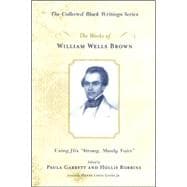Widely considered the first African-American novelist, William Wells Brown's (ca. 1814-1884) 1853 novel, Clotel, or the President's Daughter, chronicled the fate of the daughter of Thomas Jefferson and his black housekeeper. Yet, in his own day, Brown was perhaps more important as a rousing orator, scholar, and cultural critic. He escaped from slavery in 1834 and worked on Lake Erie steamboats in Buffalo, New York, helping slaves escape into Canada and lecturing for the New York Anti-Slavery Society. After moving to Boston in 1847, he began writing his autobiography, The Narrative of William W. Brown. By 1850, the book had appeared in four American and five British editions and rivaled the popularity of Frederick Douglass's Narrative written two years earlier. Throughout the late 1840s and 50s, Brown continued to lecture to further the antislavery cause and wrote prolifically. In addition to Clotel, he published the first drama written by an African American and the first military history of African Americans.
In his writings and speeches, William Wells Brown deliberately resists the tone of heroic resistance and eloquent outrage set by Frederick Douglass. Brown's rhetorical strategy involved telling stories of individuals and individual encounters in which the art of simple understatement and guileless self-presentation prevailed over cant, bullying, and hypocrisy. Brown's often humorous and deceptively artless tone appealed to politically active women who were claiming the moral high ground not only on questions of abolition but also on temperance and women's rights. Unlike Douglass, whose literary output can be described as a long conversation with the founding fathers and literary lions about freedom, liberty, and what it means to be an American, Brown emphasized-- with humor and a cosmopolitan gentility-- the concerns of middle class family life: education, parenting, and the damage that slavery was doing to American society.
This volume, with a foreword by Henry Louis Gates, Jr., will introduce readers to Brown's lesser-known, but no less powerful works, placed in the context of the era's debates on slavery, gender, morality, and the discursive limits put on anti-slavery advocacy. The collection presents Brown's anti-slavery works and the contemporary response to them in light of Brown's own attention to the role of women writers and political advocates in this period. Garrett's and Robbins's introduction to these texts emphasizes Brown's awareness and even use of women's voices in political discourse as a way of distinguishing himself from other black male voices of the time. The selection of texts also demonstrates Brown's willingness to use and recycle any texts at hand-- including his own-- in order to appeal to his immediate audience or readership. While making Brown's more obviously political work available to a wider audience, the book reclaims Brown as an important black influence in the American nineteenth century.








